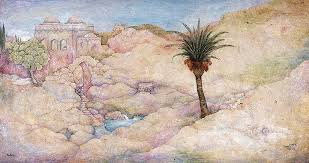 |
| Art: Dima Dmitriev |
''And from there you will seek the Lord your God, and you will find Him...'' [Va'Etchanan 4:29]
Chassidic thought teaches that in order for any entity to exist at all, God must renew it continually, by enlivening it with a spark of His own Existence. Without being connected to God - the True Existence - the entity is unable to exist. Thus, even the forces of evil must contain a Godly spark that enables them to exist.
But why, then, is it possible for the forces of evil to conceal this presence of Godliness within them?
The answer is: To make possible the amazing elevation that can be reached through teshuvah.
When a person has regressed to a very low spiritual state, the Torah teaches us that ''from there [i.e. from amidst the forces of evil] you will seek God''.
This teaches us that the Godly revelation which a person reaches through teshuvah is disproportionate to the effort involved, like ''finding'' a previously hidden treasure, as the verse states ''And you will find Him''.
Source: Lubavitcher Rebbe: Based on Ma'amer ani Ledodi, Shabbos Parshas Re'eh 5747



















